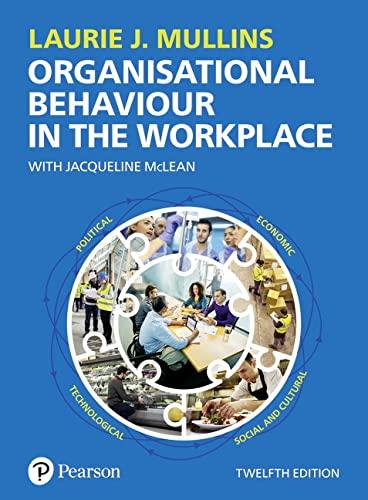Lesson 10.1: Emotional Intelligence Emotional Intelligence is a type of social intelligence that affords the individual the ability to monitor his own and others'
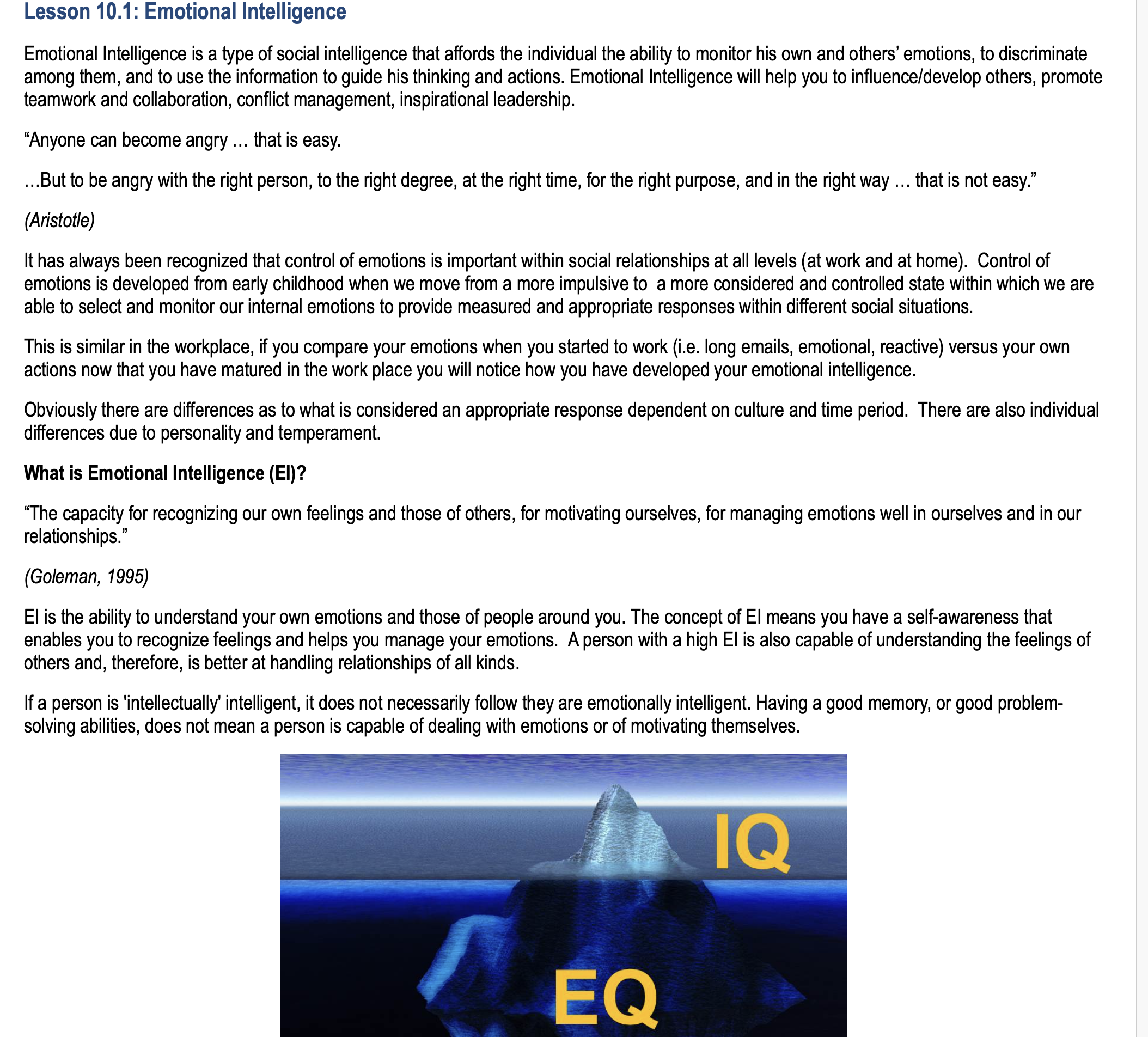
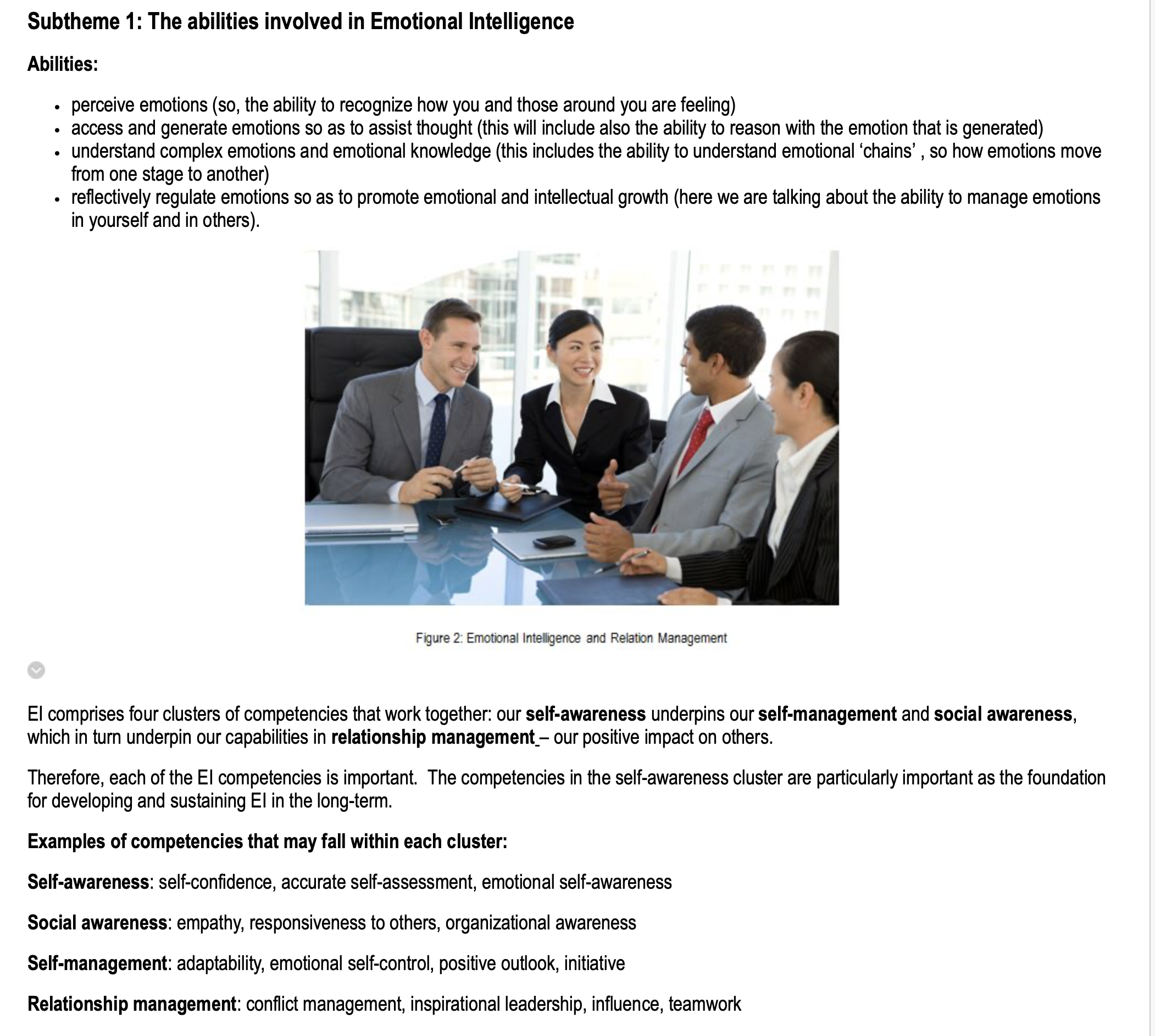
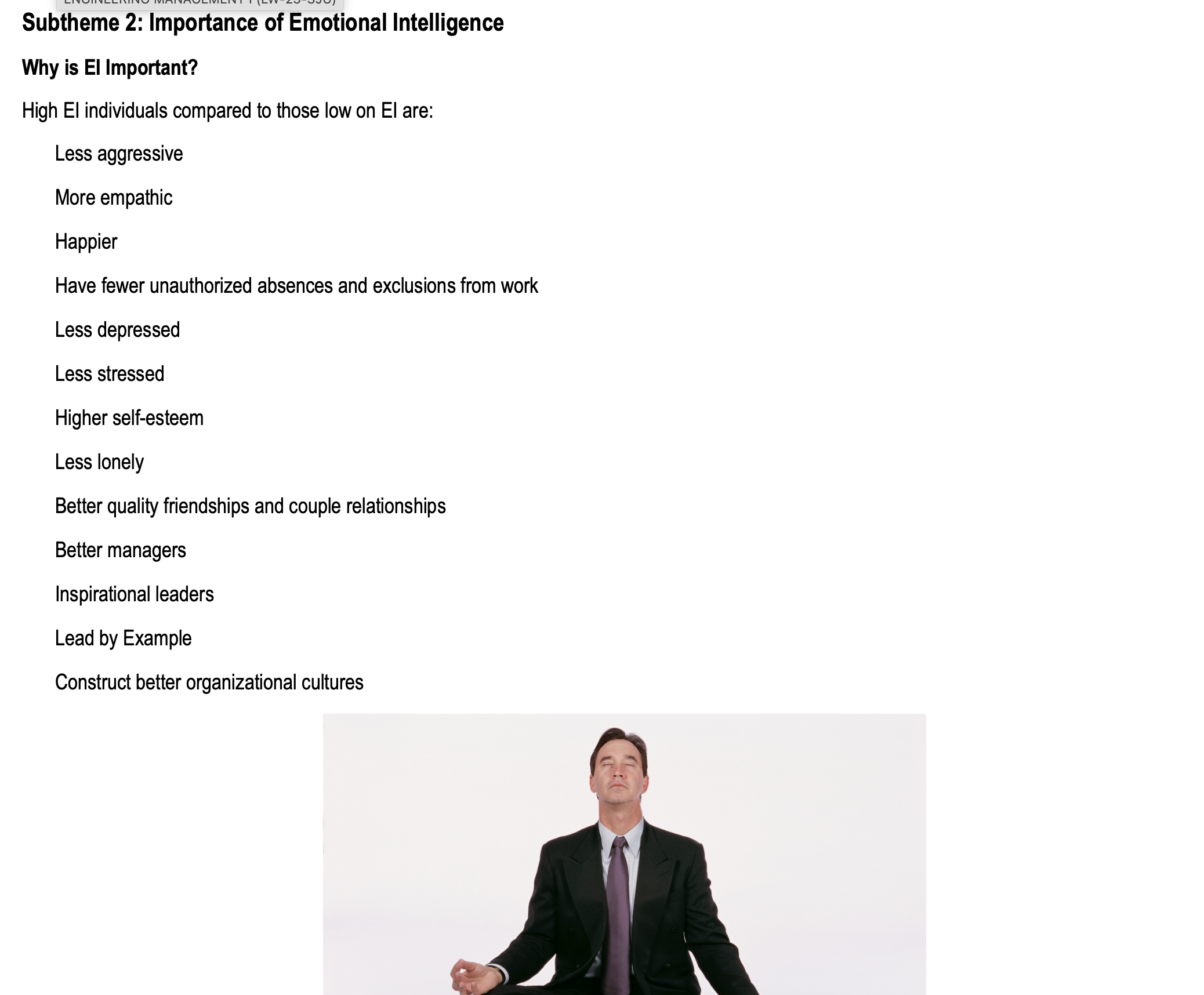

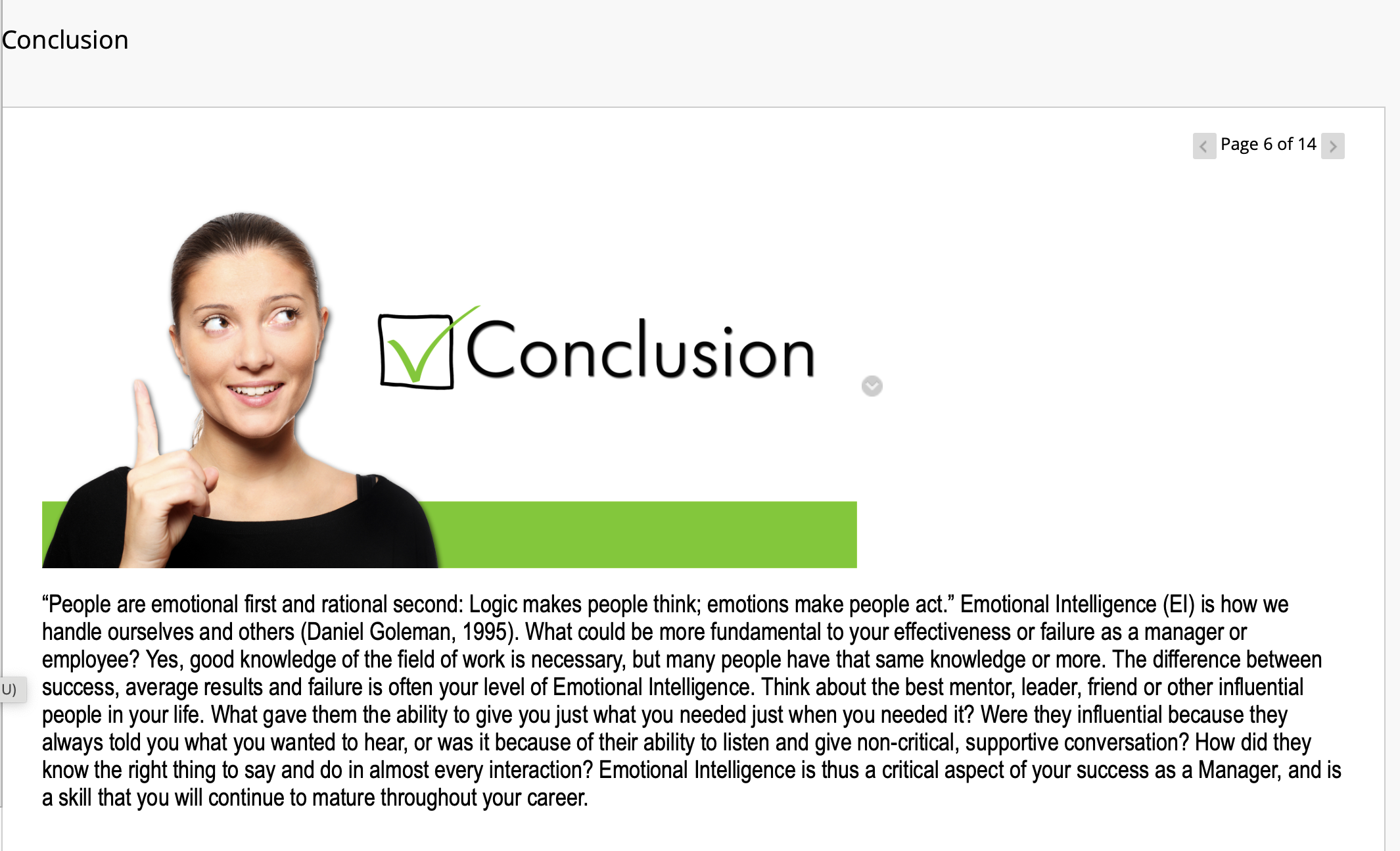
Lesson 10.1: Emotional Intelligence Emotional Intelligence is a type of social intelligence that affords the individual the ability to monitor his own and others' emotions, to discriminate among them, and to use the information to guide his thinking and actions. Emotional Intelligence will help you to influence/develop others, promote teamwork and collaboration, conflict management, inspirational leadership. "Anyone can become angry ... that is easy. ...But to be angry with the right person, to the right degree, at the right time, for the right purpose, and in the right way ... that is not easy." (Aristotle) It has always been recognized that control of emotions is important within social relationships at all levels (at work and at home). Control of emotions is developed from early childhood when we move from a more impulsive to a more considered and controlled state within which we are able to select and monitor our internal emotions to provide measured and appropriate responses within different social situations. This is similar in the workplace, if you compare your emotions when you started to work (i.e. long emails, emotional, reactive) versus your own actions now that you have matured in the work place you will notice how you have developed your emotional intelligence. Obviously there are differences as to what is considered an appropriate response dependent on culture and time period. There are also individual differences due to personality and temperament. What is Emotional Intelligence (EI)? "The capacity for recognizing our own feelings and those of others, for motivating ourselves, for managing emotions well in ourselves and in our relationships." (Goleman, 1995) El is the ability to understand your own emotions and those of people around you. The concept of El means you have a self-awareness that enables you to recognize feelings and helps you manage your emotions. A person with a high El is also capable of understanding the feelings of others and, therefore, is better at handling relationships of all kinds. If a person is 'intellectually' intelligent, it does not necessarily follow they are emotionally intelligent. Having a good memory, or good problem- solving abilities, does not mean a person is capable of dealing with emotions or of motivating themselves. IQ EQ Subtheme 1: The abilities involved in Emotional Intelligence Abilities: perceive emotions (so, the ability to recognize how you and those around you are feeling) access and generate emotions so as to assist thought (this will include also the ability to reason with the emotion that is generated) understand complex emotions and emotional knowledge (this includes the ability to understand emotional 'chains', so how emotions move from one stage to another) reflectively regulate emotions so as to promote emotional and intellectual growth (here we are talking about the ability to manage emotions in yourself and in others). Figure 2: Emotional Intelligence and Relation Management El comprises four clusters of competencies that work together: our self-awareness underpins our self-management and social awareness, which in turn underpin our capabilities in relationship management our positive impact on others. Therefore, each of the El competencies is important. The competencies in the self-awareness cluster are particularly important as the foundation for developing and sustaining El in the long-term. Examples of competencies that may fall within each cluster: Self-awareness: self-confidence, accurate self-assessment, emotional self-awareness Social awareness: empathy, responsiveness to others, organizational awareness Self-management: adaptability, emotional self-control, positive outlook, initiative Relationship management: conflict management, inspirational leadership, influence, teamwork Subtheme 2: Importance of Emotional Intelligence Why is El Important? High El individuals compared to those low on El are: Less aggressive More empathic Happier Have fewer unauthorized absences and exclusions from work Less depressed Less stressed Higher self-esteem Less lonely Better quality friendships and couple relationships Better managers Inspirational leaders Lead by Example Construct better organizational cultures 7. Recognize critical factors of Emotional Intelligence. Conclusion Conclusion Page 6 of 14 U) "People are emotional first and rational second: Logic makes people think; emotions make people act." Emotional Intelligence (EI) is how we handle ourselves and others (Daniel Goleman, 1995). What could be more fundamental to your effectiveness or failure as a manager or employee? Yes, good knowledge of the field of work is necessary, but many people have that same knowledge or more. The difference between success, average results and failure is often your level of Emotional Intelligence. Think about the best mentor, leader, friend or other influential people in your life. What gave them the ability to give you just what you needed just when you needed it? Were they influential because they always told you what you wanted to hear, or was it because of their ability to listen and give non-critical, supportive conversation? How did they know the right thing to say and do in almost every interaction? Emotional Intelligence is thus a critical aspect of your success as a Manager, and is a skill that you will continue to mature throughout your career.
Step by Step Solution
There are 3 Steps involved in it
Step: 1
Emotional intelligence is a type of social intelligence that affords the individual ability to monit...
See step-by-step solutions with expert insights and AI powered tools for academic success
Step: 2

Step: 3

Ace Your Homework with AI
Get the answers you need in no time with our AI-driven, step-by-step assistance
Get Started


